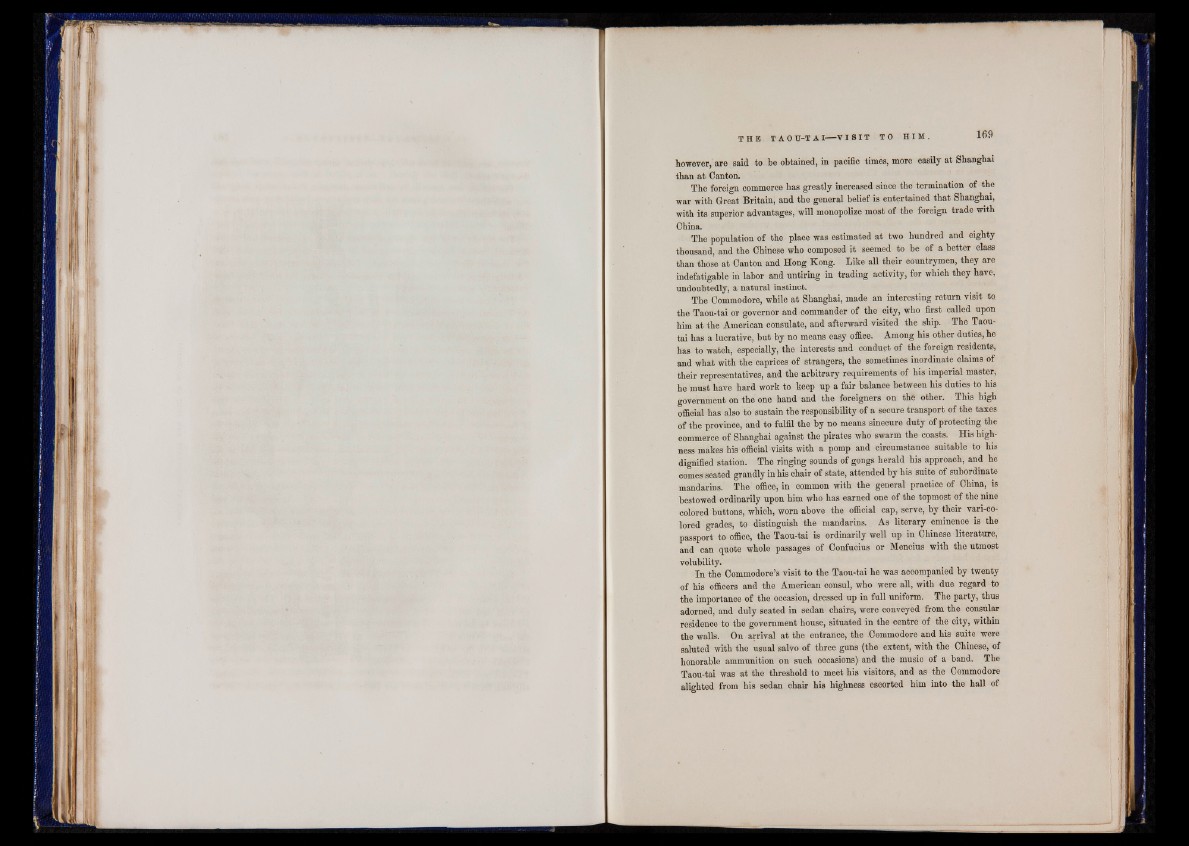
however, are said to be obtained, in pacific times, more easily at Shanghai
than at Canton.
The foreign commerce has greatly increased since the termination of the
war with Great Britain, and the general belief is entertained that Shanghai,
with its superior advantages, will monopolize most of the foreign trade with
China.
The population of the place was estimated at two hundred and eighty
thousand, and the Chinese who composed it seemed to be of a better class
than those at Canton and Hong Kong. Like all their countrymen, they are
indefatigable in labor and untiring in trading activity, for which they have,
undoubtedly, a natural instinct.
The Commodore, while at Shanghai, made an interesting return visit to
the Taou-tai or governor and commander of the city, who first called upon
him at the American consulate, and afterward visited the ship. The Taou-
tai has a lucrative, but by no means easy office. Among his other duties, he
has to watoh, especially, the interests and conduct of the foreign residents,
and what with the caprices of strangers, the sometimes inordinate claims of
their representatives, and the arbitrary requirements of his imperial master,
he must have hard work to keep up a fair balance between his duties to his
government on the one hand and the foreigners on thè other. This high
official has also to sustain the responsibility of a secure transport of the taxes
of the province, and to fulfil the by no means sinecure duty of protecting the
commerce of Shanghai against the pirates who swarm the coasts. His highness
makes his official visits with a pomp and circumstance suitable to his
dignified station. The ringing sounds of gongs herald his approach, and he
comes seated grandly in his ehair of state, attended by his suite of subordinate
mandarins. The office, in common with the general practice of China, is
bestowed ordinarily upon him who has earned one of the topmost of the nine
colored buttons, which, worn above the official cap, serve, by their vari-co-
lored grades, to distinguish the mandarins. As literary eminence is the
passport to office, the Taou-tai is ordinarily well up in Chinese literature,
and can quote whole passages of Confucius or Mencius with the utmost
volubility.
In the Commodore’s visit to the Taou-tai he was accompanied by twenty
of his officers and the American consul, who were all, with due regard to
the importance of the occasion, dressed up in full uniform. The party, thus
adorned, and duly seated in sedan chairs, were conveyed from the consular
residence to the government house, situated in the centre of the city, within
the walls. On arrival at the entrance, the Commodore and his suite were
saluted with the usual salvo of three guns (the extent, with the Chinese, of
honorable ammunition on such occasions) and the music of a band. The
Taou-tai was at the threshold to meet his visitors, and as the Commodore
alighted from his sedan chair his highness escorted him into the hall of